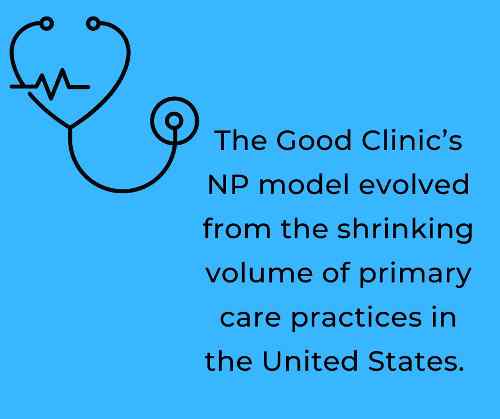The start-up healthcare chain is designed to emphasize wellness and continuity of care through a unique NP-driven model.
Editor's note: This article appears in the September/October 2022 edition of HealthLeaders magazine.
A primary care clinic start-up is differentiating itself by staffing its facilities only with nurse practitioners (NPs).
Minneapolis-based The Good Clinic chain is designed to emphasize patient engagement, continuity of care, and an emphasis on wellness and convenience through a unique nurse practitioner-driven model, says Larry Diamond, CEO of Mitesco Inc., which operates The Good Clinic brand.
More than half of U.S. states—26 states, Washington, D.C., and two U.S. territories—have granted patients full and direct access to care by NPs in adopting Full Practice Authority (FPA), according to the American Association of Nurse Practitioners (AANP).
FPA is the authorization of NPs to evaluate patients, diagnose, order, and interpret diagnostic tests, and initiate and manage treatments under the exclusive licensure authority of the state board of nursing. This regulatory framework eliminates requirements for NPs to have a collaborative practice agreement with a physician to provide patient care.
Shortage of physicians
The Good Clinic’s NP model evolved from the shrinking volume of primary care practices in the United States, which has occurred for a variety of reasons, including a sizable gap between specialty and primary care salaries, Diamond says.
As a result, physicians graduating from medical school are tending to choose specialization rather than practicing primary care, he says.
“The AMA (American Medical Association) says there's a shortage of about 25,000 to 35,000 primary care providers, which is one of the reasons why all of these urgent care centers have popped up, because in America today, it's typically two to five weeks’ waitlist to get in to see your primary care provider for just a normal visit, a physical, or just a follow-up,” Diamond says. “So, America learned, ‘Oh, if I have an earache, a sore throat, or a cut, let me run over to the urgent care clinic,’ and the challenge there is that we stopped providing care and just started fixing problems.”
But the prevalence of chronic diseases requires that healthcare do more than simply fix problems, he says.
“Diabetes is at an all-time high, and pulmonary issues, well, they all start somewhere and it's typically because they're not addressed earlier in their disease process,” he says. “If you focus on prevention, you can avoid a lot of the costs associated with people developing chronic illnesses, and then deteriorating with them, where it always costs more to address a problem later in its cycle.”
Nursing is well aligned to primary care from a philosophy perspective, Diamond says. “Nursing is about working with a patient over time, to help them overcome some of the challenges that they're experiencing, where the industry has evolved to be much more about ‘one and done. Let me do something and solve the problem,’” Diamond says. “And with chronic illness in America, it's not typically a ‘one and done’ type of solution.”
Whole-person focused
Good Clinics began when former leaders involved in starting MinuteClinic, which has since been sold to CVS, added Diamond to their team to create a primary care model that was whole-person focused—one that considered physical health, behavioral health, stressors, and how they use the healthcare system.
“The concept is about, ‘How do I take care of a person soup to nuts?’ [by] considering complementary and alternative medicine or whatever the person is interested in—yoga, meditation, supplements, vitamins, standard medicine—and to have a relationship where we co-develop a wellness plan with that person.”
Starting in FPA-friendly states
The company’s first clinic opened in February 2021, and by the end of the year it had six clinics operating around Minneapolis. Next year, it expects to open additional clinics in Minnesota, Colorado, and Arizona, with plans to expand nationwide in the coming years, particularly in states where NPs can freely practice at the top of their license.
And though NPs have FPA in slightly more than half of U.S. states, that doesn’t preclude The Good Clinic from expanding into states where NPs don’t have FPA, Diamond says. These states have reduced or restricted practice authority, but NPs are able to practice under a collaborative agreement with another health provider.
This story was updated August 26, 2022.
“Nursing is about working with a patient over time, to help them overcome some of the challenges that they're experiencing, where the industry has evolved to be much more about 'one and done.'”
— Larry Diamond, CEO, Mitesco Inc.
Carol Davis is the Nursing Editor at HealthLeaders, an HCPro brand.
KEY TAKEAWAYS
The Good Clinic’s NP model evolved from the shrinking volume of primary care practices in the United States.
Patients need more than urgent care clinics; rising chronic diseases require that healthcare do more continuity of care.
Within three years, 50 The Good Clinics are expected to be in operation.

